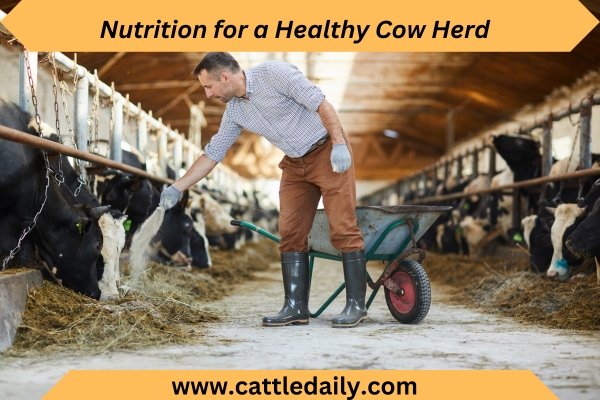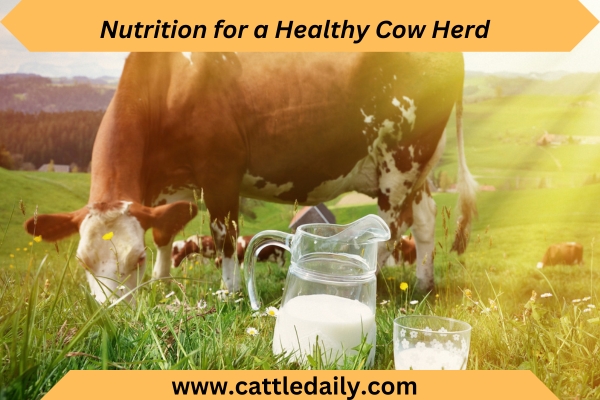Nutrition for a Healthy Cow Herd
Proper nutrition is crucial for maintaining a healthy and productive cow herd. What a dairy cow eats can significantly impact milk production, reproduction, overall health, and longevity.
When formulating rations for dairy cattle, the goal should be to provide adequate amounts of nutrients required to support various physiological functions.
Some key aspects of cow nutrition to consider are energy, protein, minerals, vitamins, and feed ingredients. in this blog post, we will talk bout, Nutrition for Healthy Cows and key minerals for dairy cows.
Energy Requirements for Dairy Cattle
The primary nutrient required by cows is energy. Energy is needed to support maintenance, growth, pregnancy, lactation, and activity. The main energy contributors in dairy cattle diets are carbohydrates and fats.
1. Carbohydrates – Carbohydrates provide the majority of energy in dairy rations. Important carbohydrate sources include forages like hay and silage as well as grains like corn, barley, and oats.
The fiber in forages is fermented by rumen microbes to produce volatile fatty acids that cows use for energy.
2. Fats – Supplemental fats are often added to increase the energy density of dairy rations. Common fat sources include tallow, grease, roasted soybeans, and distillers grains. Dietary fat increases the energy content of milk.
The energy requirements depend on the cow’s stage of lactation. For example, peak milk cows have very high energy demands, and late lactation cows have lower requirements.
Rations must be properly balanced for energy to avoid health issues like ketosis in early lactation or becoming over-conditioned in late lactation.

Meeting the Protein Needs of Dairy Cows
After energy, protein is the next most important nutrient for dairy cattle. Amino acids from dietary protein are used to support milk protein production, growth, reproduction, immune function, and tissue repair.
1. Ruminally degradable protein – Sources like soybean meal and alfalfa hay provide protein that is broken down by rumen bacteria into ammonia, which is used to synthesize microbial protein. This microbial protein is digested in the small intestine and provides amino acids to the cow.
2. Rumen undegradable protein – Sources like roasted soybeans and distiller grains provide protein that escapes degradation in the rumen. This bypasses the rumen and flows to the small intestine to provide additional amino acids for absorption.
The metabolizable protein system balances rumen degradable protein and rumen undegradable protein to optimize milk protein yield and herd health. Cows in early lactation need higher levels of dietary protein.
Key Minerals for Dairy Cows
Minerals serve many important roles in dairy cattle nutrition and productivity. They are required for structural growth, milk production, reproduction, immunity, and more. Some of the main minerals to focus on are:
1. Calcium – Needed for bone growth, milk production, muscle contraction, nerve transmission, and blood clotting. High levels are required, especially for lactating cows. Common calcium sources are limestone and dicalcium phosphate.
2. Phosphorus – Works with calcium for bone development and helps with energy production, cell signaling, and milk formation. Grains and oilseed meals contain phosphorus.
3. Magnesium – Helps regulate body temperature, muscle and nerve function, immune response, and electrolyte balance. Sources include forages, grains, and magnesium oxide.
4. Sodium and Chloride – Important for maintaining fluid balance, acid-base homeostasis, and lactation. Salt provides both sodium and chloride.
5. Potassium – Needed for water balance, protein synthesis, and enzyme activation. Abundant in forages and milk.
Trace minerals like copper, zinc, manganese, iron, selenium, cobalt, and iodine have many essential roles that impact dairy cattle health and productivity at lower dietary concentrations.

Vitamin Nutrition for Healthy Cows
Although required in smaller amounts compared to other nutrients, vitamins are vital for a properly functioning dairy cow. Some key vitamins include:
Vitamin A – Needed for vision, immune function, epithelial tissue integrity, growth, and reproductive health. Provided by green forages or can be supplemented.
Vitamin D – Works with calcium and phosphorus for proper bone development and milk production. Sunshine exposure normally provides enough vitamin D.
Vitamin E – Protects against oxidative damage, supports immunity, and aids reproduction in cows. Found in green forages and can be added as a supplement.
Niacin – Helps with energy production from carbohydrate, fat, and protein metabolism. It also supports skin health. Typically adequate in well-balanced rations.
Thiamin – Essential for energy and carbohydrate metabolism. Rumen microbes can synthesize adequate amounts in most situations.
In periods of stress or during transitions like calving, additional B-vitamin supplementation may be beneficial for dairy cows.
Feeding Practices for a Healthy Dairy Herd
Careful selection and combination of different feedstuffs is necessary to meet the nutritional requirements and lactation needs of dairy cows. Some feeding practices for a healthy productive herd include:
- Providing a high-quality and consistent base forage like corn silage, haylage, or alfalfa hay. The forage should make up 40-60% of the total ration dry matter.
- Supplementing with grains like corn, barley, oats, or milo to provide additional energy.
- They are balancing the amounts of rumen degradable protein and rumen undegradable protein. Common protein supplements are soybean meal, canola meal, and cottonseed.
- Adding supplemental fats from sources like tallow, grease, oilseeds, or distillers grains to increase energy density. Up to 5-6% dietary fat is typical.
- Including a complete vitamin and trace mineral premix to provide essential micronutrients.
- Formulating rations suitable for each stage of production – fresh cows, peak lactation, mid-lactation, late lactation, close-up, and fresh, dry cows.
- Providing sufficient amounts of fresh clean water, adequate bunk space for all cows, and routine feed analysis.
- Keeping diets consistent, but making gradual ration changes when needed. Avoid sudden large ration changes.
Proper nutrition sets up cows for success by allowing them to achieve the genetic potential for milk production and reproduction while remaining healthy.
Work closely with a qualified dairy nutritionist to formulate balanced cost-effective rations customized for your herd. Nutrition is the foundation upon which productive and profitable dairy cattle operations are built. Learn here more about cattle care and reproduction tips.


